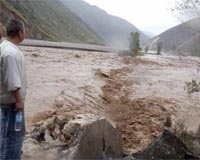 |
Washington DC (SPX) Sep 21, 2009 NASA Administrator Charles Bolden and French Space Agency President Yannick d'Escatha signed four agreements in support of U.S. and French space cooperation during a ceremony Thursday at NASA Headquarters in Washington. "The French Space Agency has a long history of participating with NASA in Earth and space science missions," Bolden said. "I am pleased to see this cooperation expand as we look to further engage the international community in exploring space." The Centre National d'Etudes Spatiales, or CNES, is the French government agency responsible for shaping and implementing the country's space policy in Europe. It was founded in 1961 and headquartered in Paris. The CNES mission is to invent future space systems, bring space technologies to maturity and guarantee France's independent access to space. The agreements involve missions in NASA's Science Mission Directorate in Washington. They are: A Mars Atmosphere and Volatile Evolution mission scheduled to launch in 2013. This NASA-led project will provide the first direct measurements to address key scientific questions about the evolution of the red planet. CNES will provide the Solar Wind Electron Analyzer sensor to measure solar wind and ionospheric electrons. A Magnetospheric MultiScale mission scheduled to launch in 2014. This is a NASA-led, four spacecraft project. It will make measurements to help explain the fundamental physical processes involved with magnetic reconnection, particle acceleration and turbulence on both the micro and meso scales in the Earth's magnetosphere. CNES will provide portions of the instrument suite for the investigation. A Convection Rotation and Planetary Transits mission launched in December 2006. The project is led by CNES in conjunction with the European Space Agency and other international partners. The agreement involves participation by U.S. scientists in the data analysis of planetary observations in return for NASA time for follow-up ground observations by the Keck telescope in Mauna Kea in Hawaii. A Surface Water and Ocean Topography mission for the study and definition of potential cooperation on this Earth Science Decadal Survey mission. The project could give scientists the first comprehensive view of Earth's freshwater bodies from space and more detailed measurements of the ocean surface than ever before, thereby enabling improved water management and climate predictions. NASA's Science Mission Directorate engages the nation's science community, sponsors scientific research and develops and deploys satellites and probes in collaboration with NASA's international partners to answer fundamental questions requiring a view from and into space. The directorate studies Earth as a planet, explores the planetary bodies of our solar system, studies the sun and its influence throughout the solar system, and scans the universe to gauge its expanse while searching for Earth-like planets. Share This Article With Planet Earth
Related Links NASA The latest information about the Commercial Satellite Industry
 Developing Nations Can Use Space Solutions For Earth-Bound Problems
Developing Nations Can Use Space Solutions For Earth-Bound ProblemsColorado Springs CO (SPX) Sep 18, 2009 Some of the solutions to many developing nations' social and economic woes might just come from the most unlikely place - outer space. The Colorado Springs-based Space Foundation said in a white paper released this week that the ability of space-based technology to overcome infrastructure and access issues might help solve previously insurmountable economic, public health, and standard of living ... read more |
|
| The content herein, unless otherwise known to be public domain, are Copyright 1995-2009 - SpaceDaily. AFP and UPI Wire Stories are copyright Agence France-Presse and United Press International. ESA Portal Reports are copyright European Space Agency. All NASA sourced material is public domain. Additional copyrights may apply in whole or part to other bona fide parties. Advertising does not imply endorsement,agreement or approval of any opinions, statements or information provided by SpaceDaily on any Web page published or hosted by SpaceDaily. Privacy Statement |